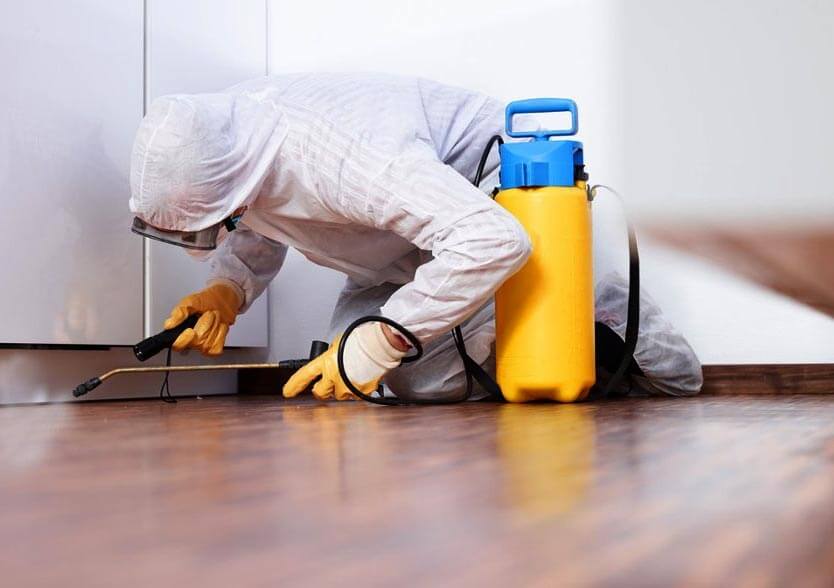Pest control is one of the trickiest disputes involved in rental properties. Generally, this is because the legislation concerning the issue is vague, and the cause of the pest infestation is also subject to dispute.
Pest control should be a clause in your lease agreement that will outline the responsibility of each party. If you have recently moved into a property and there is an infestation of termites, cockroaches, wasps, ants, mice, etc, your landlord will most likely pay the extermination bill.
If you have been at the property for many years and you suddenly get bedbugs or cockroaches, it is going to be harder to get the landlord to pay as it was most likely you who are responsible for the sudden arrival of the pests.

Providing a sanitary and habitable property up for rent is a minimum responsibility to expect from a landlord, so, generally speaking, pest control is the landlord’s or the property owner’s responsibility.
It should be guaranteed that the landlord has to at least have general pest control conducted before the rental is put up on the market. However, clauses that can further help in disputes can be found in the signed agreements or the lease agreements. This can be in terms of the specifics concerning general pest control and/or seasonal pest control.
General pest control refers to the application of pesticides and other methods to keep pests below economic thresholds by either eliminating or hindering the development of unwanted pest presence in an area.
Seasonal Pest Control
Normally, seasonal pest control should be included in such agreements. The landlord is not only responsible for making the space free from pests before the tenants move in, but he/she should keep it in that way. For instance, by natural occurrences or if the property is susceptible to pests, the property owner is responsible for eliminating these risks.
Other responsibilities of the landlord:
- Inspect the property from pests or its susceptibility to pests
- Conduct a general and/or seasonal pest control for the property
- Tend to the tenant’s report of pest infestation/Conduct a pest control
- Pay for the pest control services before solving the dispute on whether the tenant caused the infestation
While all of the things mentioned are the responsibilities of the landlord, this does not come without exceptions.
Pest control lease agreements
The lease agreement can be considered as the bible between the tenant and the landlord. In this case, the lease should explicitly state that the landlord is delivering the rental property in good condition and that they are responsible for the pest control.
The lease should also word out the terms concerning pests for both the tenant and the landlord. Verbal agreements may not hold out when the problem goes south and disputes arise. By having a lease agreement with a clear pest clause, both interests are protected.
While most existing laws state that property owners should provide tenants with rental property free from vermin, such existing laws still cannot protect both tenants and landlords from specific problems that may arise.

When is pest control the responsibility of the tenant?
Unless the infestation is already present upon moving in or caused by natural phenomena, it can be the tenant’s responsibility. If the invasion is proven to be brought by the tenant’s behavior and doings, then the tenant shall shoulder the responsibility.
Additionally, if the tenant caused damage such as cracks and leaks to the property that can lead to the entry of pests such as rats, snakes, etc., the fault is on the tenant’s part. Thus, damages to the property shall be reported.
Other tenant behaviors that can lead to pest infestation:
- Unsanitary living practices such as improper storage of food and other items, failing to properly dispose of garbage, or not covering garbage bins
- Practices that can create conditions that produce excess moisture and filth that makes the property conducive for pest invasion
- Leaving stagnant water or muck on the premises
- Fleas and/or tick infestation due to the tenant’s pet/s
If the tenant spots an infestation, they should inform the property owner in a timely manner, or else they can partly be blamed for the problem and be held liable.
How to ask landlords for pest control?
In reporting an infestation and needing to have your landlord conduct pest control, there are only a few steps that you have to follow.
Step 1: Check your lease agreement
Firstly, you need to thoroughly check your lease agreement. As mentioned, pest control should be included in your agreement. Landlords usually include pest control clauses in these agreements to equally protect your interests, theirs, and the property.
With a proper lease agreement, your report shall be tended as agreed. However, lease agreements do not override state laws; thus, it’s important to review the document properly and be guided about what state laws have in place for property owners and tenants.
Step 2: Document the infestation
Next, you will want to document the cause of the infestation. This, additionally, may come helpful in disputes that question whether it’s the landlord’s fault or the tenant’s. Taking pictures and seeking the help of specialists or exterminators can help with this matter.
Normally, reports should be given to the landlord immediately. Tenants must not keep pest infestations waiting or else they will be held responsible. After reporting, the landlord should promptly address the report by hiring an exterminator.
Additionally, the landlord should inform you that pest control services will be coming through the property, to have you prepared for the necessary adjustments. The tenants are expected to cooperate with the schedule and efforts of pest control.
Who is responsible for pest control in a commercial property?
Pests in a commercial property can provide great nuisance to the tenants and the landlord. Whether the space is rented to serve as a restaurant, an office space, a warehouse, or for industrial purposes, pest control should not be taken lightly.
It can be tricky for a commercial rental property to determine who’s responsible for pest control. However, it can be simple if viewed in terms of the tenant-landlord relationship as discussed above.
Generally speaking, the terms and responsibilities concerning pest control shall be explicitly stipulated in the lease agreement. Since commercial rentals naturally have more at stake, the lease should have a proper pest clause written that safeguards both its tenants and the landlord.
Is the tenant to blame?
Normally, if the infestation is due to the tenant’s unsanitary and improper practice, then they should shoulder the responsibility. If the negligence is proven to be the landlord’s or if the infestation is caused by natural occurrences, then the landlord should bear responsibility.
If the concerned property is required to have pest control efforts, it’s important to communicate with the specialists or exterminators to determine what type of method to apply. This is to protect clients or occupants since some chemicals may be harmful to their health.
Ultimately, the best case for the parties involved is to be certain that pest problems and concerns are addressed properly in the lease agreements. Since existing laws are vague, one of the parties may be given an unfair hand just because the lease failed to address the necessary specifics.
Kinds of Pest Infestations and responsibility
Not all types of pest control would be covered in your lease agreement. For example of a rogue snake made it’s way into your property, it’s hardly the responsibility of the landlord.
Landlords responsibility
These types of infestations and pests should be exterminated at the cost of the landlord. These are the types of infestations that can not or are unlikely to be caused by the tenant.
- Ants
- Bees/ Wasps/ Hornets
- Mosquitos
- Spiders
- Termites
- Ticks and Fleas
Kinds of Pests:
- Ants
- Bed Bugs
- Bees and/or Wasps
- Cockroaches
- Mosquitos
- Rats and/or Mice
- Snakes
- Spiders
- Termites
- Ticks and Fleas
Tenants responsibility
If you as a tenant have not been keeping everything clean and sanitary, there is a good chance your actions can attract certain infestations.











